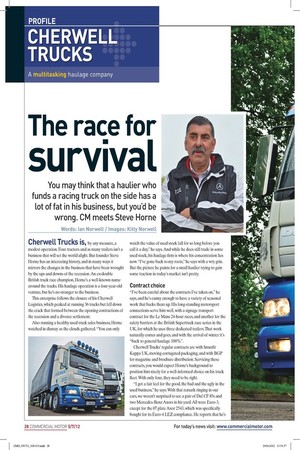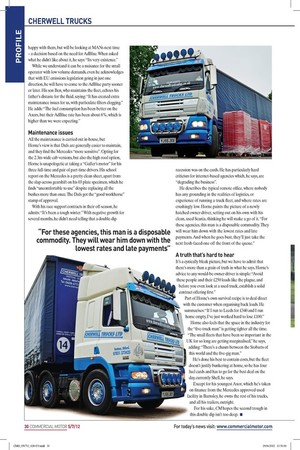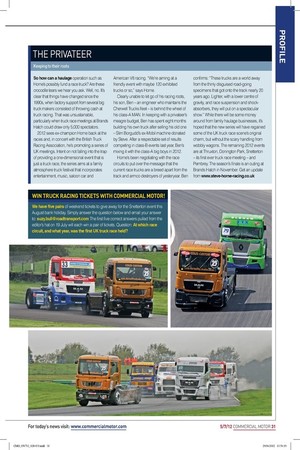The race for
Page 21

Page 23

Page 24

If you've noticed an error in this article please click here to report it so we can fix it.
survival
You may think that a haulier who funds a racing truck on the side has a lot of fat in his business, but you’d be wrong. CM meets Steve Horne
Words: Ian Norwell / Images: Kitty Norwell
Cherwell Trucks is, by any measure, a modest operation. Four tractors and as many trailers isn’t a business that will set the world alight. But founder Steve Horne has an interesting history, and in many ways it mirrors the changes in the business that have been wrought by the ups and downs of the recession. An ex-double British truck race champion, Horne’s a well-known name around the tracks. His haulage operation is a four-year-old venture, but he’s no stranger to the business.
This enterprise follows the closure of his Cherwell Logistics, which peaked at running 36 trucks but fell down the crack that formed between the opening contractions of the recession and a divorce settlement.
Also running a healthy used truck sales business, Horne watched in dismay as the clouds gathered. “You can only watch the value of used stock fall for so long before you call it a day,” he says. And while he does still trade in some used stock, his haulage firm is where his concentration lies now. “I’ve gone back to my roots,” he says with a wry grin. But the picture he paints for a small haulier trying to gain some traction in today’s market isn’t pretty.
Contract choice
“I’ve been careful about the contracts I’ve taken on,” he says, and he’s canny enough to have a variety of seasonal work that backs them up. His long-standing motorsport connections serve him well, with a signage transport contract for the Le Mans 24-hour races, and another for the safety barriers at the British Supertruck race series in the LTK, for which he uses three dedicated trailers. That work naturally comes and goes, and with the arrival of winter it’s “back to general haulage 100%”.
Cherwell Trucks’ regular contracts are with Smurfit Kappa LTK, moving corrugated packaging, and with BGP for magazine and brochure distribution. Servicing these contracts, you would expect Horne’s background to position him nicely for a well-informed choice on his truck fleet. With only four, they need to be right.
“I got a fair feel for the good, the bad and the ugly in the used business,” he says. With that remark ringing in our ears, we weren’t surprised to see a pair of Daf CF 85s and two Mercedes-Benz Axors in his yard. All were Euro-3, except for the 07 plate Axor 2543, which was specifically bought for its Euro-4 LEZ compliance. He reports that he’s happy with them, but will be looking at MANs next time – a decision based on the need for AdBlue. When asked what he didn’t like about it, he says: “Its very existence.” While we understand it can be a nuisance for the small operator with low volume demands, even he acknowledges that with EU emissions legislation going in just one direction, he will have to come to the AdBlue party sooner or later. His son Ben, who maintains the fleet, echoes his father’s distaste for the fluid, saying: “It has created extra maintenance issues for us, with particulate filters clogging.” He adds: “The fuel consumption has been better on the Axors, but their AdBlue rate has been about 6%, which is higher than we were expecting.”
Maintenance issues
All the maintenance is carried out in-house, but Horne’s view is that Dafs are generally easier to maintain, and they find the Mercedes “more sensitive” . Opting for the 2.3m-wide cab versions, but also the high-roof option, Horne is unapologetic at taking a “Gaffer’s motor” for his three full-time and pair of part-time drivers. His school report on the Mercedes is a pretty clean sheet, apart from the slap-across gearshift on his 03 plate specimen, which he finds “uncomfortable to use” despite replacing all the bushes more than once. The Dafs got the “good workhorse” stamp of approval.
With his race support contracts in their off-season, he admits: “It’s been a tough winter.” With negative growth for several months, he didn’t need telling that a double-dip recession was on the cards. He has particularly hard criticism for internet-based agencies which, he says, are “degrading the business”.
He describes the typical remote office, where nobody has any grounding in the realities of logistics, or experience of running a truck fleet, and where rates are crushingly low. Horne paints the picture of a newly hatched owner-driver, setting out on his own with his clean, used Scania, thinking he will make a go of it. “For these agencies, this man is a disposable commodity. They will wear him down with the lowest rates and late payments. And when he goes bust, they’ll just take the next fresh-faced one off the front of the queue.”
A truth that’s hard to hear
It’s a cynically bleak picture, but we have to admit that there’s more than a grain of truth in what he says. Horne’s advice to any would-be owner-driver is simple: “Avoid these people and their £250 loads like the plague, and before you even look at a used truck, establish a solid contract offering first.” Part of Horne’s own survival recipe is to deal direct with the customer when organising back loads. He summarises: “If I run to Leeds for £340 and I run home empty, I’ve just worked hard to lose £100.” Horne also feels that the space in the industry for the “five-truck man” is getting tighter all the time. “The small fleets that have been so important in the UK for so long are getting marginalised,” he says, adding: “There’s a chasm between the Stobarts of this world and the five-gig man.” He’s done his best to contain costs, but the fleet doesn’t justify bunkering at home, so he has four fuel cards and has to go for the best deal on the day, currently Shell, he says.
Except for his youngest Axor, which he’s taken on finance from the Mercedes approved used facility in Barnsley, he owns the rest of his trucks, and all his trailers, outright.
For his sake, CM hopes the second trough in this double dip isn’t too deep. ■
THE PRIVATEER
Keeping to their roots So how can a haulage operation such as Horne’s possibly fund a race truck? Are these crocodile tears we hear you ask. Well, no. It’s clear that things have changed since the 1990s, when factory support from several big truck makers consisted of throwing cash at truck racing. That was unsustainable, particularly when truck race meetings at Brands Hatch could draw only 5,000 spectators.
2012 sees ex-champion Horne back at the races and, in concert with the British Truck Racing Association, he’s promoting a series of UK meetings. Intent on not falling into the trap of providing a one-dimensional event that is just a truck race, the series aims at a family atmosphere truck festival that incorporates entertainment, music, saloon car and American V8 racing. “We’re aiming at a friendly event with maybe 120 exhibited trucks or so,” says Horne.
Clearly unable to let go of his racing roots, his son, Ben – an engineer who maintains the Cherwell Trucks fleet – is behind the wheel of his class-A MAN. In keeping with a privateer’s meagre budget, Ben has spent eight months building his own truck after selling his old one – Slim Borgudd’s ex-Mobil machine donated by Steve. After a respectable set of results competing in class-B events last year, Ben’s mixing it with the class-A big boys in 2012.
Horne’s been negotiating with the race circuits to put over the message that the current race trucks are a breed apart from the track and armco destroyers of yesteryear. Ben
confirms: “These trucks are a world away from the thinly disguised road-going specimens that got onto the track nearly 20 years ago. Lighter, with a lower centre of gravity, and race suspension and shockabsorbers, they will put on a spectacular show.” While there will be some money around from family haulage businesses, it’s hoped that the new series will have regained some of the UK truck race scene’s original charm, but without the scary handling from wobbly wagons. The remaining 2012 events are at Thruxton, Donington Park, Snetterton – its first ever truck race meeting – and Pembrey. The season’s finale is an outing at Brands Hatch in November. Get an update from www.steve-horne-racing.co.uk
WIN TRUCK RACING TICKETS WITH COMMERCIAL MOTOR!
We have five pairs of weekend tickets to give away for the Snetterton event this August bank holiday. Simply answer the question below and email your answer to: suzy.bull@roadtransport.com The first five correct answers pulled from the editor’s hat on 19 July will each win a pair of tickets. Question: At which race circuit, and what year, was the first UK truck race held?










































